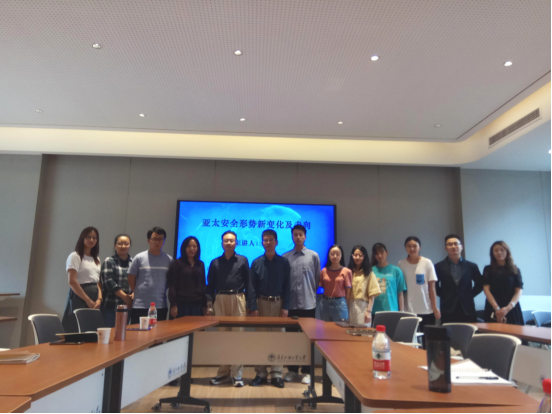At 2:00 p.m. on April 27, 2021,the Academy of International and Regional Studies and CCSof GDUFS invited researcher Liu Qing to deliver a thematic report on "new changes in the Asia Pacific situation" for teachers and students. Dr. Liu isvice president of the China Institute of International Studies, the Special Allowance Expert of the State Council, executive director of the Chinese Association of Asia-Pacific Studies, and secretary general of Global Center for Mekong Studies. Professor Tang Xiaosong, director of CCS and rotating chairman ofthe Academy of International and Regional Studies, presided over the lecture.

Researcher Liu Qing mainly talked about four issues. Firstly, the Asia Pacific situation has changed greatly. He believed that peace and development were still the mainstream, but under a new situation marked by changes unseen in a century. The sudden impact of COVID-19 had increased uncertainty in the world. With the eastward shift of the global strategic focus, the strategic competition of major powers also moved eastward, and all kinds of risk factors were increasing. At present, China-US relations had entered a new stage dominated by competition, and a new interactive paradigm had emerged.
Secondly, he introduced the dominant characteristics of the Asia Pacific situation. Competition among major powers had intensified. The United States took the lead in implementing the Indo-Pacific strategy and were promoting front-line deployment; Europe was also promoting its Indo-Pacific strategy; China's military capability had improved. In addition, it was difficult to quiet down regional hot issues. The issue of the Diaoyu Islands was hyped again, and Japan was emboldened given support from the United States; the sensitivity of the Taiwan issue increased, which enlarged the risk of misjudgment; the South China Sea issue was frequently challenged, and the influence of the United States could not be ignored; and the internal affairs of Afghanistan, Pakistan, Myanmar and other countries were in critical condition.
Thirdly, he analyzed hidden risks in the Asia Pacific situation. He emphatically pointed out three "grey" security risks: the scourge of terrorist forces was moving eastward; the color revolution resurged; and religious contradictions were reactivated. In particular, recently, the United States had accused China's Xinjiang of the so-called "forced labor" problem, but in fact it aimed to alienate China's relations with the Islamic world.
Fourthly, Liu Qing talked about how to maintain peace and development in the Asia Pacific region. He pointed out that we must firmly follow the guidance of Xi Jinping's diplomatic thoughts, and grasp the international situation. Meanwhile we should establish the correcthistorical and situational outlooks, as well as the outlook for China’s role,while strengthening “our confidence”. Finally, we should actively promote regional integration, build a regional security mechanism, strengthen crisis management and control, and properly respond to gray security challenges.

